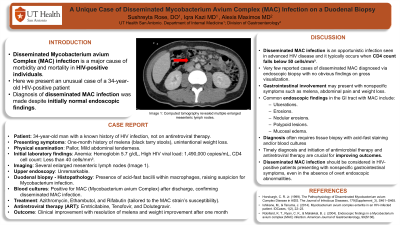Monday Poster Session
Category: General Endoscopy
P2417 - A Unique Case of Disseminated Mycobacterium Avium Complex (MAC) Infection in a 34-Year-Old HIV-Positive Patient
Monday, October 28, 2024
10:30 AM - 4:00 PM ET
Location: Exhibit Hall E

Has Audio

Sushreyta Rose, DO
UTHSCSA
San Antonio, TX
Presenting Author(s)
Sushreyta Rose, DO1, Iqra Kazi, MD2, Alexis Maximos, MD2
1UTHSCSA, San Antonio, TX; 2University of Texas Health San Antonio, San Antonio, TX
Introduction: Disseminated Mycobacterium avium Complex (MAC) infection is a significant cause of morbidity and mortality in Human Immunodeficiency Virus (HIV) positive individuals. We present a case of a 34-year-old HIV-positive patient, leading to the diagnosis of disseminated MAC infection despite initially normal endoscopic findings.
Case Description/Methods: A 34-year-old man with a known history of HIV infection, not on antiretroviral therapy, presented with a one-month history of melena and unintentional weight loss. Physical examination revealed pallor and mild abdominal tenderness. Initial laboratory investigations were notable for anemia (hemoglobin 5.7g/dL), high HIV viral load (1,490,000 copies/mL) and CD4 cell count less than 40cells/mm³. Imaging showed several enlarged mesenteric lymph nodes. Upper endoscopy was unremarkable however duodenal biopsy was performed. Histopathological examination revealed the presence of several acid-fast bacilli within macrophages, raising suspicion for Mycobacterium infection. Subsequent blood cultures were positive for MAC after discharge, confirming disseminated MAC infection. The patient was initiated on a multidrug antimycobacterial regimen in the outpatient setting, including azithromycin, ethambutol, and rifabutin, tailored to the susceptibility profile of the isolated MAC strain. Antiretroviral therapy was also initiated with emtricitabine, tenofovir and dolutegravir. The patient showed clinical improvement with resolution of melena and improvement of his weight in a month.
Discussion: Disseminated MAC infection is an opportunistic infection in advanced HIV disease, typically occurring when the CD4 count falls below 50 cells/mm³. There are very few reported cases of disseminated MAC diagnosed via endoscopic biopsy with no obvious findings on gross visualization. Gastrointestinal involvement can manifest as nonspecific symptoms such as melena, abdominal pain, or weight loss. Common endoscopic findings in the GI tract with MAC include ulcerations, erosions, nodular erosions, polypoid lesions, and mucosal edema. Diagnosis often requires tissue biopsy with acid-fast staining or blood cultures. Timely diagnosis and initiation of appropriate antimicrobial and antiretroviral therapy are crucial for improving outcomes in these patients. Disseminated MAC infections should be considered in HIV-positive patients presenting with non-specific gastrointestinal symptoms, even in the absence of overt endoscopic abnormalities as seen in this patient presentation.
Disclosures:
Sushreyta Rose, DO1, Iqra Kazi, MD2, Alexis Maximos, MD2. P2417 - A Unique Case of Disseminated Mycobacterium Avium Complex (MAC) Infection in a 34-Year-Old HIV-Positive Patient, ACG 2024 Annual Scientific Meeting Abstracts. Philadelphia, PA: American College of Gastroenterology.
1UTHSCSA, San Antonio, TX; 2University of Texas Health San Antonio, San Antonio, TX
Introduction: Disseminated Mycobacterium avium Complex (MAC) infection is a significant cause of morbidity and mortality in Human Immunodeficiency Virus (HIV) positive individuals. We present a case of a 34-year-old HIV-positive patient, leading to the diagnosis of disseminated MAC infection despite initially normal endoscopic findings.
Case Description/Methods: A 34-year-old man with a known history of HIV infection, not on antiretroviral therapy, presented with a one-month history of melena and unintentional weight loss. Physical examination revealed pallor and mild abdominal tenderness. Initial laboratory investigations were notable for anemia (hemoglobin 5.7g/dL), high HIV viral load (1,490,000 copies/mL) and CD4 cell count less than 40cells/mm³. Imaging showed several enlarged mesenteric lymph nodes. Upper endoscopy was unremarkable however duodenal biopsy was performed. Histopathological examination revealed the presence of several acid-fast bacilli within macrophages, raising suspicion for Mycobacterium infection. Subsequent blood cultures were positive for MAC after discharge, confirming disseminated MAC infection. The patient was initiated on a multidrug antimycobacterial regimen in the outpatient setting, including azithromycin, ethambutol, and rifabutin, tailored to the susceptibility profile of the isolated MAC strain. Antiretroviral therapy was also initiated with emtricitabine, tenofovir and dolutegravir. The patient showed clinical improvement with resolution of melena and improvement of his weight in a month.
Discussion: Disseminated MAC infection is an opportunistic infection in advanced HIV disease, typically occurring when the CD4 count falls below 50 cells/mm³. There are very few reported cases of disseminated MAC diagnosed via endoscopic biopsy with no obvious findings on gross visualization. Gastrointestinal involvement can manifest as nonspecific symptoms such as melena, abdominal pain, or weight loss. Common endoscopic findings in the GI tract with MAC include ulcerations, erosions, nodular erosions, polypoid lesions, and mucosal edema. Diagnosis often requires tissue biopsy with acid-fast staining or blood cultures. Timely diagnosis and initiation of appropriate antimicrobial and antiretroviral therapy are crucial for improving outcomes in these patients. Disseminated MAC infections should be considered in HIV-positive patients presenting with non-specific gastrointestinal symptoms, even in the absence of overt endoscopic abnormalities as seen in this patient presentation.
Disclosures:
Sushreyta Rose indicated no relevant financial relationships.
Iqra Kazi indicated no relevant financial relationships.
Alexis Maximos indicated no relevant financial relationships.
Sushreyta Rose, DO1, Iqra Kazi, MD2, Alexis Maximos, MD2. P2417 - A Unique Case of Disseminated Mycobacterium Avium Complex (MAC) Infection in a 34-Year-Old HIV-Positive Patient, ACG 2024 Annual Scientific Meeting Abstracts. Philadelphia, PA: American College of Gastroenterology.
